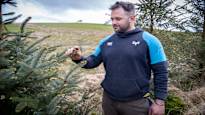Spruce trees are planted in tight rows, as a wood field. In a few years, they have grown 4-5 meters tall. Jack Lydiate harps between the trees habitually.
– The forest company took care of everything, planting trees, contacts with the authorities and others. I sat on top of the hill, drank coffee and watched while others did the work, he says with satisfaction and encourages others in the next video.
Lydiate’s farm in central Wales has 200 hectares of land, 500 sheep, twenty cows and chickens. By local standards, the space is not large.
The economy is tight. Switching to organic was easy and profitable twenty years ago, but now there are new clouds in the sky. According to Lydiate, Britain’s departure from the EU has made life uncertain.
– Because of Brexit, almost every month you have to think about whether this activity can be continued, he says.
A tree came to the rescue. Some of the land on the Lydiate farm has poor soil and trees have already been planted on 60 hectares. 75 percent of the plantations are commercial spruce, the rest are slower-growing hardwoods such as oak.
Wales pays the foresters good subsidies, and in a few years there will be a day of reckoning. Lydiate has also sold emission credits to companies that wanted to reduce their carbon footprint.
– It was something I didn’t even know about in advance and came as the icing on the cake for this project, says the station wagon driver.
Climate criticism for Sunak’s government
Britain has been one of the trendsetters in the fight against climate change. Among the G7 countries, it has reduced its climate emissions the fastest. On the eastern side of the country, on the Dogger Basin of the North Sea, the world’s largest offshore wind farm is about to be built.
Rishi Sun too however, the government has received criticism for e.g. moving the target dates of some climate measures.
– Sunak has focused more on energy security and increasing energy self-sufficiency, including nuclear power, wind power, and has also continued to exploit the North Sea’s oil and gas reserves citing its own energy security. Energy security has been highlighted especially after the start of the Russian war of aggression, the embassy counselor responsible for climate issues at the Finnish Embassy in London Terhi Bunders tells.
Parliamentary elections will be held in Britain on July 4.
Britain has a legal goal to reach net zero, i.e. a balance of climate emissions and sinks, in 2050. One part of this is planting forests.
The government in the plans is to increase the forest area by 8,400 square kilometers, or about the size of Uusimaa. In addition, 7,250 square kilometers of bogs are to be restored. Protected areas will be increased by 4,000 square kilometers by 2030.
This would have a huge impact on British agriculture, according to a report by the country’s oldest conservation organization, the Royal Society for Protection of Birds (RSPB). 60 percent of Britain’s surface area is used for agriculture, and it would decrease by more than a fifth after planting and conservation measures.
– Technically, it is possible for the British land sector to reach the point where in 2050 it will no longer increase the temperature of the climate. However, it will require ambitious action in terms of land use, the lead author of the RSPB report Tom Finch says the Financial Times magazine in the interview.
The change can be seen on the dinner plates
Changes in agriculture have been held back by major changes, i.e. the pandemic, Russia’s attack on Ukraine and Brexit.
– Our own agricultural policy is one of the few possible advantages of being outside the European Union, and we have not taken advantage of it. I think it’s shameful, because we could try different things in agricultural policy and send a message to Europe about how these things should best be handled, says the population biology professor Charles Godfray from the University of Oxford.
According to Godfray, more should be taken out of the countries with the best soil, sustainably of course.
The change would also be visible on the dinner plates, although the peri-British breakfast with bacon is unlikely to disappear anywhere. Meat consumption is already decreasing, in the last decade the consumption of red meat fell a quarter.
However, the government cannot dictate what citizens should do, says Godfray. The question is tricky.
– I sometimes get annoyed with environmental organizations that shout that things must change. They don’t take into account the difficult political and economic compromises involved, Godfray says.
A change in diet could be sold with health benefits. Godfray says he always uses Finland as an example of a country where good work is being done against obesity.
The history of Britain’s forests is a sad one. The island kingdom’s trees have been effectively trimmed over the centuries.
Because of the First World War, a lot of forest was cut down. After that, only 5 percent of Britain’s surface area was covered with trees, now the number is 13. Three quarters of the surface area of Finland, the most forested country in Europe, is forest.
Britain’s national landscape can change.
At Lydiate’s farm, there are already the first signs of it. The sheep farmer has noticed that the rest of nature has changed along with the trees. There are already more birds, deer and insects in the new forests.
